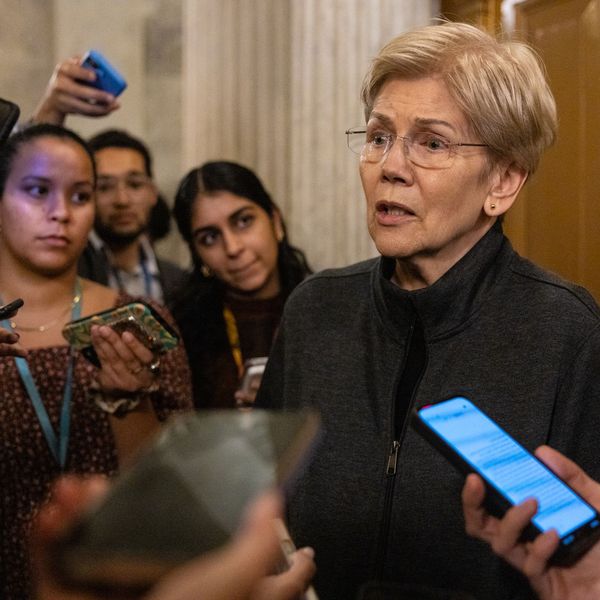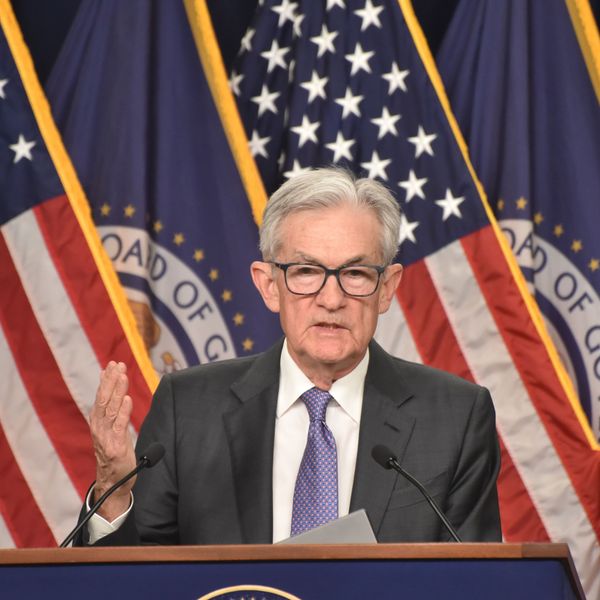Larry Summers Pulls Out of Fed Chairman Race
Larry Summers has withdrawn his name from consideration to be Chairman of the Federal Reserve.
"I have reluctantly concluded that any possible confirmation process for me would be acrimonious and would not serve the interest of the Federal Reserve, the Administration or, ultimately, the interests of the nation's ongoing economic recovery," Summers is quoted as saying in a letter to the president, CNBC reports.
Critics said that Summers represented the destructive 'Washington-to-Wall Street revolving door.'
In a piece entitled "Gag Me With Lawrence Summers," Truthdig editor Robert Scheer wrote:
As Clinton's Treasury secretary, he pushed for radical deregulation allowing investment bankers to take wild risks with the federally insured deposits of ordinary folks, a disastrous move compounded when he successfully urged Congress to pass legislation banning the effective regulation of the tens of trillions in derivatives that often proved to be toxic. [...]
...Obama, following Summers' advice, adopted the save-the-bankers-first philosophy of his predecessor, with outrageous publicly funded bailouts of the same financial conglomerates that had put the economy into a deep tailspin. It is a policy that continues to this day, with an outlay of $85 billion a month by the Federal Reserve to purchase toxic assets from the banks' books in the hopes that they will reinvest that largess. But as the president's jobs critique noted, they haven't.
Trillions have been passed on to the banks to relieve them of the burden of the toxic derivatives they created, derivatives that then-Treasury Secretary Summers testified to Congress were no threat to the "thriving market" that "has assumed a major role in our own economy and become a magnet for derivative business from around the world." No threat there because, "given the nature of the underlying assets involved ... there would seem to be little scope for market manipulation. ... "
Economist Dean Baker wrote that Summers has a "dismal track record" and tried "to put a break on efforts by consumer groups and their allies in Congress to rein in" bad lending practices.
"Even more important than his role in pushing financial deregulation," Baker wrote, "is the fact that Summers played a direct role in promoting the imbalances from which the economy continues to suffer."
______________________
An Urgent Message From Our Co-Founder
Dear Common Dreams reader, The U.S. is on a fast track to authoritarianism like nothing I've ever seen. Meanwhile, corporate news outlets are utterly capitulating to Trump, twisting their coverage to avoid drawing his ire while lining up to stuff cash in his pockets. That's why I believe that Common Dreams is doing the best and most consequential reporting that we've ever done. Our small but mighty team is a progressive reporting powerhouse, covering the news every day that the corporate media never will. Our mission has always been simple: To inform. To inspire. And to ignite change for the common good. Now here's the key piece that I want all our readers to understand: None of this would be possible without your financial support. That's not just some fundraising cliche. It's the absolute and literal truth. We don't accept corporate advertising and never will. We don't have a paywall because we don't think people should be blocked from critical news based on their ability to pay. Everything we do is funded by the donations of readers like you. Will you donate now to help power the nonprofit, independent reporting of Common Dreams? Thank you for being a vital member of our community. Together, we can keep independent journalism alive when it’s needed most. - Craig Brown, Co-founder |
Larry Summers has withdrawn his name from consideration to be Chairman of the Federal Reserve.
"I have reluctantly concluded that any possible confirmation process for me would be acrimonious and would not serve the interest of the Federal Reserve, the Administration or, ultimately, the interests of the nation's ongoing economic recovery," Summers is quoted as saying in a letter to the president, CNBC reports.
Critics said that Summers represented the destructive 'Washington-to-Wall Street revolving door.'
In a piece entitled "Gag Me With Lawrence Summers," Truthdig editor Robert Scheer wrote:
As Clinton's Treasury secretary, he pushed for radical deregulation allowing investment bankers to take wild risks with the federally insured deposits of ordinary folks, a disastrous move compounded when he successfully urged Congress to pass legislation banning the effective regulation of the tens of trillions in derivatives that often proved to be toxic. [...]
...Obama, following Summers' advice, adopted the save-the-bankers-first philosophy of his predecessor, with outrageous publicly funded bailouts of the same financial conglomerates that had put the economy into a deep tailspin. It is a policy that continues to this day, with an outlay of $85 billion a month by the Federal Reserve to purchase toxic assets from the banks' books in the hopes that they will reinvest that largess. But as the president's jobs critique noted, they haven't.
Trillions have been passed on to the banks to relieve them of the burden of the toxic derivatives they created, derivatives that then-Treasury Secretary Summers testified to Congress were no threat to the "thriving market" that "has assumed a major role in our own economy and become a magnet for derivative business from around the world." No threat there because, "given the nature of the underlying assets involved ... there would seem to be little scope for market manipulation. ... "
Economist Dean Baker wrote that Summers has a "dismal track record" and tried "to put a break on efforts by consumer groups and their allies in Congress to rein in" bad lending practices.
"Even more important than his role in pushing financial deregulation," Baker wrote, "is the fact that Summers played a direct role in promoting the imbalances from which the economy continues to suffer."
______________________
Larry Summers has withdrawn his name from consideration to be Chairman of the Federal Reserve.
"I have reluctantly concluded that any possible confirmation process for me would be acrimonious and would not serve the interest of the Federal Reserve, the Administration or, ultimately, the interests of the nation's ongoing economic recovery," Summers is quoted as saying in a letter to the president, CNBC reports.
Critics said that Summers represented the destructive 'Washington-to-Wall Street revolving door.'
In a piece entitled "Gag Me With Lawrence Summers," Truthdig editor Robert Scheer wrote:
As Clinton's Treasury secretary, he pushed for radical deregulation allowing investment bankers to take wild risks with the federally insured deposits of ordinary folks, a disastrous move compounded when he successfully urged Congress to pass legislation banning the effective regulation of the tens of trillions in derivatives that often proved to be toxic. [...]
...Obama, following Summers' advice, adopted the save-the-bankers-first philosophy of his predecessor, with outrageous publicly funded bailouts of the same financial conglomerates that had put the economy into a deep tailspin. It is a policy that continues to this day, with an outlay of $85 billion a month by the Federal Reserve to purchase toxic assets from the banks' books in the hopes that they will reinvest that largess. But as the president's jobs critique noted, they haven't.
Trillions have been passed on to the banks to relieve them of the burden of the toxic derivatives they created, derivatives that then-Treasury Secretary Summers testified to Congress were no threat to the "thriving market" that "has assumed a major role in our own economy and become a magnet for derivative business from around the world." No threat there because, "given the nature of the underlying assets involved ... there would seem to be little scope for market manipulation. ... "
Economist Dean Baker wrote that Summers has a "dismal track record" and tried "to put a break on efforts by consumer groups and their allies in Congress to rein in" bad lending practices.
"Even more important than his role in pushing financial deregulation," Baker wrote, "is the fact that Summers played a direct role in promoting the imbalances from which the economy continues to suffer."
______________________

